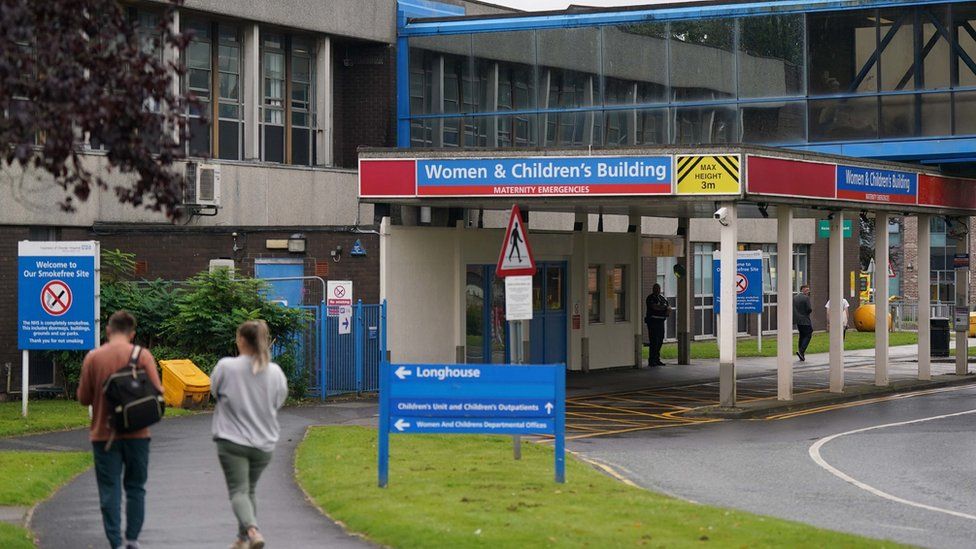
The nurse was found guilty of murdering seven babies at the Countess of Chester Hospital
By Michael Buchanan
BBC News
The former chair of the NHS trust where serial killer Lucy Letby worked believes the board was “misled” by hospital executives.
The nurse was convicted on Friday of murdering seven babies and trying to murder another six at the Countess of Chester Hospital.
Sir Duncan Nichol, who was the board’s chair, said it was told there was “no criminal activity pointing to any one individual” despite concerns.
A public inquiry has been ordered.
Letby targeted the babies between June 2015 and June 2016, when they were dying or suddenly collapsing at five times the average annual rate at the hospital’s neonatal unit.
However the board was not alerted to the problems until July 2016, by which time 13 babies had died.
At a meeting, the board then agreed to ask for the deaths to be externally investigated.
Police arrested Lucy Letby at her home in 2018
The trust initially turned to the Royal College of Paediatrics and Child Health, who conducted a review of the unit but told the hospital executives they should conduct a separate “thorough external independent review of each unexpected neonatal death”.
Ian Harvey, who was then medical director at the hospital, contacted London-based neonatologist Dr Jane Hawdon.
The doctor, who specialises in the care of newborns, did a brief review of each baby’s medical notes.
However she told the trust she did not have the time to conduct the thorough investigation the Royal College had recommended.
It is understood Dr Hawdon did not speak directly to the board but sent her report and it was up to executives to brief the board on its findings.
In a statement to the BBC, Sir Duncan said: “I believe that the board was misled in December 2016 when it received a report on the outcome of the external, independent case reviews.
“We were told explicitly that there was no criminal activity pointing to any one individual, when in truth the investigating neonatologist had stated that she had not had the time to complete the necessary in-depth case reviews.”
In response to Sir Duncan’s statement, the hospital’s then chief executive Tony Chambers – who went on to lead three other NHS trusts on an interim basis after leaving Chester in 2018 – said that “what was shared with the board was honest and open and represented our best understanding of the outcome of the reviews at the time”.
Image source, Cheshire Police
Inside the neonatal unit at the Countess of Chester Hospital
In a BBC interview, Dr Susan Gilby – another former chief executive at the hospital – said she also had concerns the board may have been misled.
When she joined the trust shortly after Letby’s arrest in 2018, she examined internal information about the nurse’s actions.
“The documents that I have seen from the neonatologist [Dr Hawdon] and the briefing and the papers that were presented to the board are diametrically opposed.
“It’s hard to understand – unless there is something that I haven’t seen – how the board were led to believe that a comprehensive review had taken place.”
Mr Harvey, who was medical director at the hospital trust until 2018, said: “The statements I gave to the board were true to the best of my knowledge.”
Three years ago, Sir Duncan, who stepped down in 2019, and Dr Gilby commissioned an external review by the health consultancy Facere Melius into how the hospital trust had handled the allegations.
It has not been published.
Both have welcomed the public inquiry into the events at the trust and said they would cooperate.
Paediatric consultants who raised concerns about Letby’s conduct have recently told the BBC of being bullied, ignored and forced to send her a letter of apology.
Image source, Cheshire Police
Letby was charged in November 2020 with murder and attempted murder
- Neonatal nurse Lucy Letby has been convicted of murdering seven babies and trying to murder another six babies while working at the Countess of Chester Hospital.
- She targeted the babies between June 2015 and June 2016.
- A BBC investigation found hospital bosses failed to investigate allegations against her and tried to silence doctors, according to a lead consultant.
- The hospital also delayed calling the police despite months of warnings that the nurse may have been killing babies.
- The government has ordered an independent inquiry, which will look at how clinicians’ concerns were handled.
- The 33-year-old, who refused to enter the dock for the most recent verdicts, is due to be sentenced on Monday after a 10-month trial at Manchester Crown Court.
Why not follow BBC North West on Facebook, Twitter and Instagram? You can also send story ideas to northwest.newsonline@bbc.co.uk








